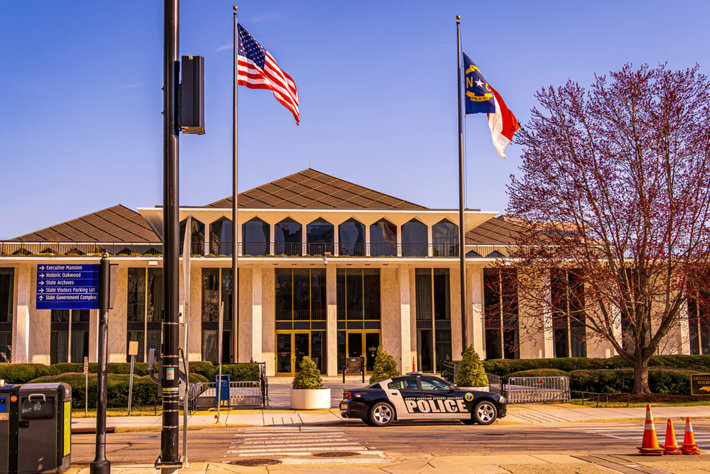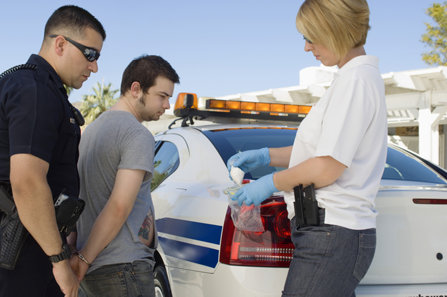Multiple States Stiffen Penalties on Drug Dealing. But Will This Solve America’s Addiction Epidemic?

As fatal overdoses continue to soar, states nationwide are significantly increasing criminal penalties for those caught dealing drugs. The hope is that such penalties will disincentivize drug dealing. Unfortunately, no supply-side approach to curbing drug use will be fully effective unless paired with efforts to curb the demand for drugs.
North Carolina Plans to Pass New Laws that Stiffen Penalties for Drug Dealers
North Carolina made national headlines in March of this year when the state Senate announced it was considering a bill that would increase punishments for drug dealers whose distribution of fentanyl and other controlled substances resulted in an overdose death. Fentanyl overdoses have risen precipitously in the state, causing lawmakers, public health officials, and policymakers to scramble for solutions. In 2021, more than 4,000 North Carolinians died of drug overdoses, the highest death toll ever recorded in that state. More than 77% of those deaths were linked to fentanyl.
In simple terms, the bill being discussed in the N.C. Senate Judiciary Committee would create a high-grade felony offense for deaths caused by distributing certain controlled substances such as fentanyl. The bill would also increase fine amounts for trafficking heroin, fentanyl, and carfentanil by setting a sliding scale based on the quantity of drugs seized during an arrest.
“We don’t want people to be using drugs with someone else and be afraid they’re going to catch a charge so they’re going to simply refuse to call 911.”
Critically, the bill allows for the state’s Good Samaritan laws to remain in place – laws designed to incentivize addicts to call 911 if a fellow user overdoses – even if the person calling 911 was the one who gave the addict the drugs. Senator Danny Britt, a Robeson County resident and primary bill sponsor, spoke to this point. “We want to encourage people to seek assistance,” he said. “We don’t want people to be using drugs with someone else and be afraid they’re going to catch a charge so they’re going to simply refuse to call 911.” In addition to the support for the bill from both Senate Democrats and Republicans, the bill has earned support from first responders and law enforcement.
West Virginia Makes Drug Dealing and Possession a Felony

Similar law-making efforts are afoot in West Virginia. A national news article from February broke with this headline: “West Virginia’s Senate has passed a bill that would make it a felony to possess fentanyl and some other illegal drugs in the opioid-ravaged state.” Unlike the North Carolina bill, which focuses on drug dealers, the West Virginia bill makes it a felony to possess fentanyl and other illicit drugs like heroin, cocaine, PCP, LSD, and methamphetamine.
The West Virginia bill is not the first of its kind in the state, a state that has had by far the highest rate of opioid-related overdose deaths since this drug crisis began in the early-2000s. Last year, West Virginia Governor Jim Justice signed a bill that increased penalties for fentanyl distribution to a prison term of three to 15 years. The bill also increased penalties to 10 to 20 years for transporting fentanyl into West Virginia from out of state.
North Carolina and West Virginia are just two of many states that have made significant efforts in recent years to tackle their respective drug addiction epidemics. Across the nation, virtually every U.S. state is considering legislation and signing bills into law to reduce the addiction nightmare in that state, with efforts ranging from crackdowns on dealers to harm reduction efforts for addicts.
For efforts to be successful, each state must include provisions that make qualified, residential addiction treatment more accessible to addicts.
Treatment for Drug Addiction Must be Included in Plans to Curb Drug Use

In North Carolina and West Virginia, the state legislatures focus on tackling each state’s drug crisis from a supply-side angle, i.e., cracking down on those who are trafficking and dealing drugs. However, public health officials and community advocates also speak to the need for increased access to treatment. In an article announcing North Carolina’s highest-ever drug overdose deaths in 2021, N.C. Department of Health and Human Services Secretary Kody H. Kinsley said, “North Carolina’s communities and families are meeting the tragedy of overdose deaths and the opioid crisis head-on, every day. With the right treatment and support, recovery is possible, and individuals can go on to live full and productive lives. Our goal is to break the costly cycle of addiction.”
“With the right treatment and support, recovery is possible, and individuals can go on to live full and productive lives. Our goal is to break the costly cycle of addiction.”
According to the National Institute on Drug Abuse, only about 13% of those suffering from drug addiction receive treatment. And while some addicts may resist treatment, that low percentage is partially the fault of states for simply not making treatment more available to addicts. For example, the Community Prevention Initiative reports that for every federal and state dollar spent managing the consequences of drug abuse, only 1.5¢ is spent on treatment and 0.5¢ on prevention.
States are correct to recognize drug addiction as a critical epidemic that must be addressed. But a multi-pronged approach is necessary to curb the growing public health emergency brewing in North Carolina, West Virginia, and other states. And just as the state governments must make treatment resources available for addicts, family members and loved ones of addicts must also do their part to help their loved ones get clean.
If you know someone using drugs, someone who cannot stop using mind-altering substances on their own, please do everything you can to get that person into treatment at a qualified drug rehab center.
Sources:
- USNews. “N.C. Senate Considers Stiffer Penalties for Drug Distribution.” U.S. News, 2023. usnews.com
- NCGA. “SENATE BILL 189 Judiciary Committee Substitute Adopted 3/7/23.” North Carolina General Assembly, 2023. ncleg.gov
- USNews. “West Virginia Senate Enhances Drug Penalties to Felony.” U.S. News, 2023. usnews.com
- APNews. “States look for solutions as U.S. fentanyl deaths keep rising.” AP News. 2022. apnews.com
- NCDHHS. “North Carolina Reports 22% Increase In Overdose Deaths.” North Carolina Department of Health and Human Services, 2023. ncdhhs.gov
- NIDA. “Making Addiction Treatment More Realistic and Pragmatic: The Perfect Should Not be the Enemy of the Good.” National Institute on Drug Abuse, 2022. nida.nih.gov
- CPI. “The Power of Substance Abuse Prevention: Why Invest in Prevention.” Community Prevention Initiative, 2011. ca-cpi.org


 ®
®